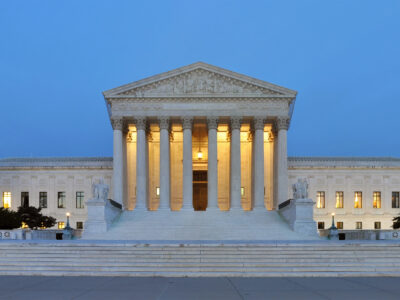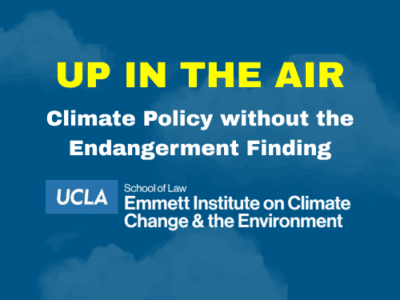Court to Interior: Not so fast on rule change
In April, Interior Secretary Ken Salazar asked a federal court to vacate a last-minute Bush administration rule relaxing stream buffer zone requirements for dumping waste from mountaintop removal mining. Salazar said that the rule didn’t pass the smell test, and that it had been improperly issued without ESA consultation. Environmental groups which had challenged the rule welcomed Salazar’s announcement, but the National Mining Association, which had intervened in support of the rule, vigorously opposed it. Yesterday, Judge Henry Kennedy of the federal district court in Washington, D.C., denied Salazar’s motion. Where no court has ruled on the merits, he said, an agency cannot unilaterally repeal a rule without going through the normal notice and comment procedure required by the Administrative Procedure Act.
The ruling is frustrating for opponents of mountaintop removal mining, who are convinced that the Bush rule was unlawful. But the dangers of allowing a new administration to duck the public rulemaking process by simply declaring that its predecessor had made a legal error are obvious. If the administration is really serious about stopping mountaintop removal (which is not entirely clear, given its equivocal behavior over the past several months), it has plenty of other tools at its disposal in the short run, while it goes through the notice and comment procedure to restore the old buffer rule. And of course Salazar’s public proclamation that the Bush rule was improperly adopted ought to help plaintiffs persuade Judge Kennedy to enjoin implementation of the Bush rule pending judicial review. (Hat tip: Charleston Gazette.)
Reader Comments
4 Replies to “Court to Interior: Not so fast on rule change”
Comments are closed.







Have any last-minute environmental Bush rules been withdrawn? I seem to remember several ways rules could be reversed. Depending on cost to the economy, they can be withdrawn by a new administration within a certain time after appearing in the Federal Register. They can be rewritten from scratch. Congress can reverse a new rule under a law passed in the late 90’s (by Republicans to reverse Clinton rules). I’ve heard the latter called the nuclear option and I think it was used to reverse a Bush rule earlier this year on health care. I don’t know of any reversals of any Bush environmental regulatory changes.
The last-minute Bush administration ESA consultation rules were withdrawn in May, under an appropriations rider that authorized withdrawal of that specific rule without going through APA procedures. See here: http://legalplanet.wordpress.com/2009/05/05/section-7-status-quo-reinstated/ The rider also authorized withdrawal of the special rule for polar bears, but Interior decided to let that one stand.
A new administration can suspend rules that have not become effective before inauguration day, as the Bush administration did when it took over from the Clinton administration. That wasn’t as helpful for the Obama administration because the Bush White House had done a better job than Clinton’s people of getting their last-minute rules out far enough ahead of their departure.
The congressional procedure you’re thinking of is the Congressional Review Act, which provides special expedited procedures (i.e. no filibusters) for voting down regulations. It must be used within 60 in-session days of the issuance of the rule, but the clock resets if a Congress ends before 60 days have passed. This Congress had until May 15 to use the CRA. There was an effort to repeal the ESA rules through that process, but the appropriations rider turned out to be an easier path. That path, or stand-alone legislation, is always open to the Congress.
In some cases, the new administration might be able to settle litigation by withdrawing or agreeing not to enforce a new rule. Environmental groups screamed about that tactic when it was used by the Bush administration. Judge Kennedy’s ruling in the National Parks and Conservation Association case is a signal that at least some courts are going to be tough on that approach, at least if a party to the case objects.
OMB Watch has a good concise white paper on the various methods for getting rid of an outgoing administration’s regulatory leavings, here:
http://www.ombwatch.org/files/regs/aftermidnight.pdf Sean discussed that white paper and the midnight regulation phenomenon here: http://legalplanet.wordpress.com/2009/02/12/midnight-regulations-and-how-the-obama-administration-can-improve-federal-regulation/
Thank you for the detailed response. I’d forgotten about the ESA rules. I was one of the folks outraged when Norton settled the wilderness suit with Utah and then applied the settlement to all BLM lands nationwide. (Wasn’t that a suit Utah had already lost?)
Ken Ward’s bog “Coal Tattoo” linked to an article in the Times that’s relevant. It mentions a 15-page ESA opinion from 1996 that (my understanding) covers ALL coal mines–new and proposed–nationwide. I’m sure you know about this opinion. I found its existence a bit unbelievable.
http://www.nytimes.com/gwire/2009/08/10/10greenwire-enviro-groups-tread-lightly-with-endangered-sp-84703.html
Thanks, Red Desert. I did not know about the generic biological opinion, but it doesn’t surprise me. FWS, under the Bush administration especially but also under the Clinton administration, has been anxious to minimize ESA consultation on actions subject to some review under other federal laws, including the Clean Water Act, Federal Insecticide, Fungicide and Rodenticide Act and, as the story you linked to shows, the Surface Mining Control and Reclamation Act. These other laws are always a poor substitute for specific ESA review, because they don’t bring the same attention to ecological detail.